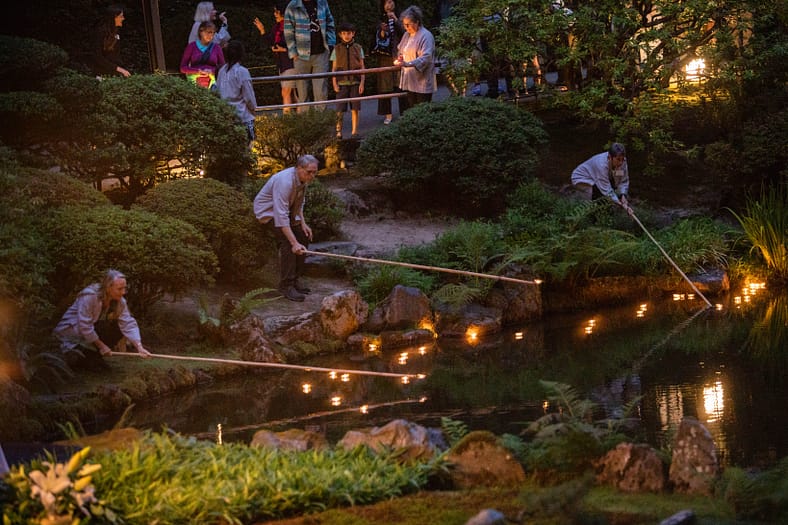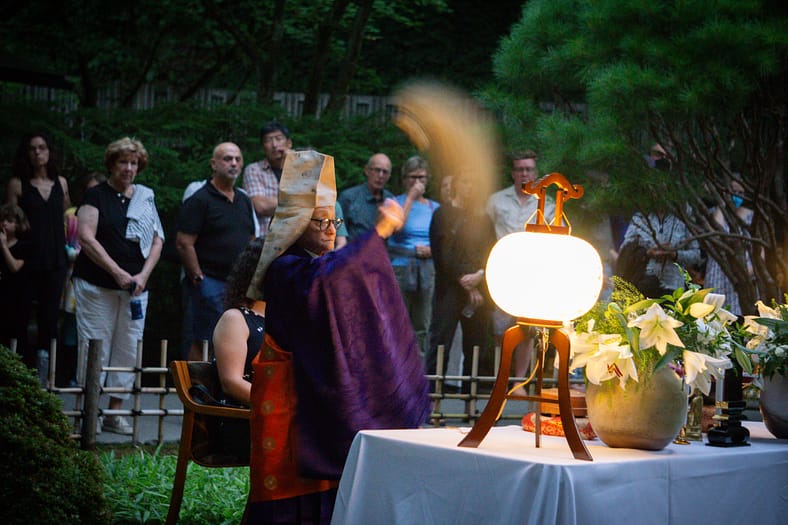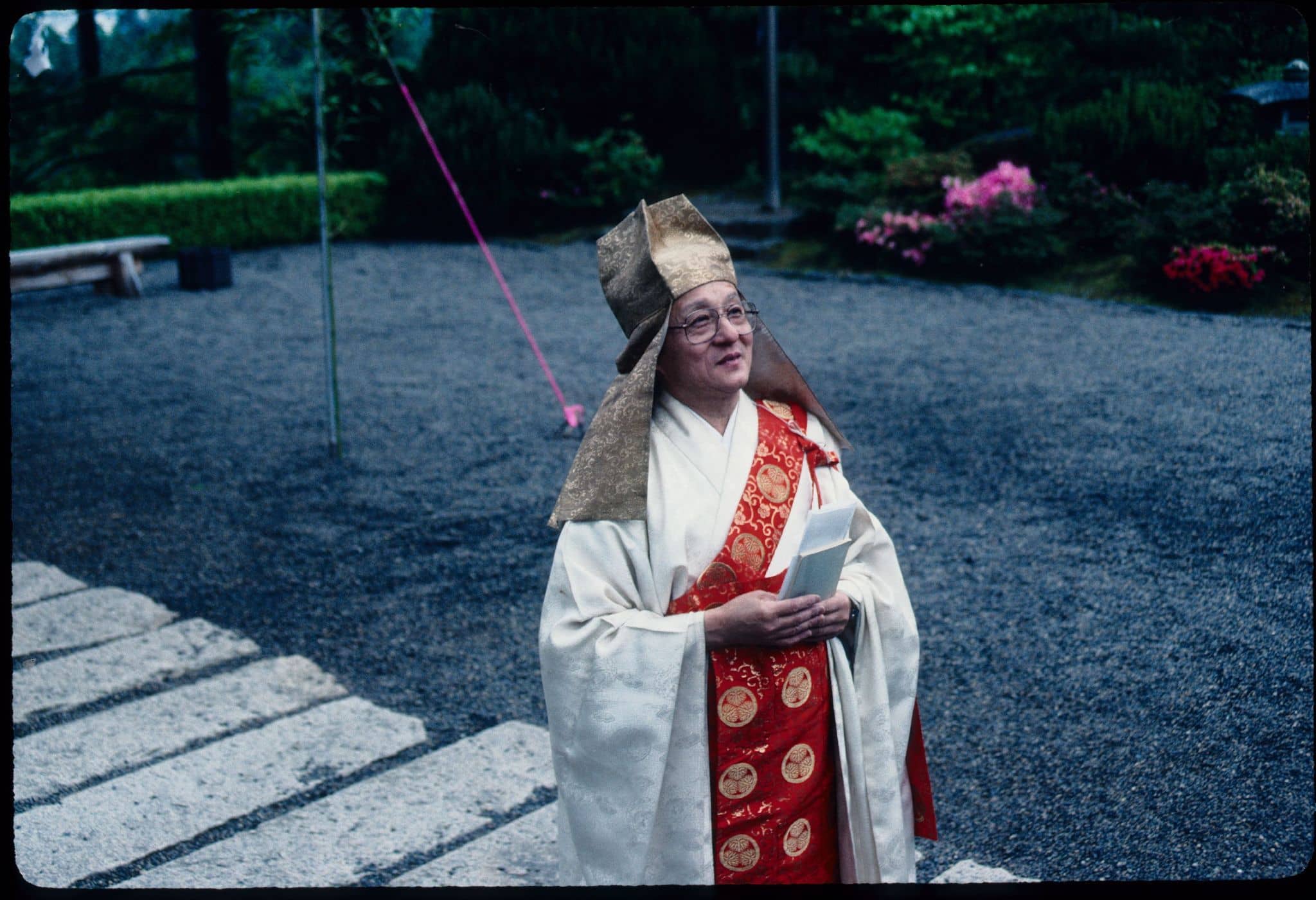Saturday, 8/17 Event Canceled:
- The 8/17 event has been canceled due to inclement weather. However, on Saturday from 8am-4pm, while the weather holds, we will have a table set up with O-Bon decorations and incense at the Garden so that you may still have a way to honor your loved one in a meaningful way. We apologize for the inconvenience and disruption in plans.
- If you submitted a name, it will be read at this evening’s O-Bon event (Friday, 8/16). You can watch it by visiting Portland Japanese Garden’s Instagram page here. We apologize for the inconvenience and the disruption of your plans. Thank you for your understanding.

Portland Japanese Garden members are invited to take part in O-Bon, the Spirit Festival, an important Buddhist festival to honor ancestors and pray for the souls of the departed.
Join us during the magical hours of dusk in the Garden as we pay tribute to the memory of loved ones. O-Bon is both one of Portland Japanese Garden’s longest-held traditions and biggest events of the year. Reverend Zuigaku Kodachi, who proposed the idea of hosting the Spirit Festival to our organization in 1976, has introduced members of all religions and backgrounds to the Buddhist tradition of honoring the departed for close to half a century.

At the Upper Pond, Rev. Kodachi chants the Lotus Sutra, or Myohorengekyo, in Japanese. Members mourn peacefully together as names of the recently departed are read. During toro nagashi, a ceremony of floating lanterns, members watch with quiet reverence as candles float in the Upper Pond near the Moon Bridge. The beautiful five-story Sapporo Pagoda Lantern in our Strolling Pond Garden and other lanterns throughout our landscape are lit to help the spirits find their way home.
This event is available exclusively to members of Portland Japanese Garden. For those who are unable to join in-person, we will be livestreaming this event on our Instagram. To learn when this livestream will place, please reference our weekly newsletter.

About O-Bon
O-Bon is a Buddhist festival for commemorating ones’ ancestors, which dates back more than 1,300 years. Traditionally, the spirits of the ancestors are believed to temporarily return to this world to reunite with their relatives during O-Bon. Other than New Year’s Day, O-Bon is the other most important holiday in Japan.
Throughout Japan, Buddhist services are held at temples and homes from August 13-15 to pray for one’s ancestors, particularly those who have died within the past year. This serves as a reminder of the importance of family ties, as a gesture of respect for those who have gone before, and as an acknowledgment of the brevity and preciousness of life as a family.
Candles, lanterns, and other fires are lit to guide the spirits back to the heavens. Toro-nagashi, a ceremony of floating lanterns, is celebrated in many regions on the last night of O-Bon. Floating paper lanterns are lit with candles and released into a river or the sea to guide the ancestral spirits back to the spirit world.
Families also visit the cemetery to clean the graves of relatives and pay their respects by offering flowers and burning incense. Also, people clean their homes and offer a variety of foods to the spirits of their ancestors in front of their butsudan (family altar), decorated with flowers and paper lanterns.
Remarks from Reverend Zuigaku Kodachi on the History of O-Bon

Reverend Zuigaku Kodachi is Head Priest of the Buddhist congregation, Nichiren Shu Minori Kai, and Professor Emeritus at Lewis & Clark University. Reverend Kodachi first moved to the United States from his native Japan more than 60 years ago and has helped educate multiple generations on both Buddhism and Japanese culture writ large. Among the many acts of cultural diplomacy the Reverend has embarked on was the introduction of O-Bon (the Spirit Festival) to Portland Japanese Garden in 1976.
Prior to chanting, Reverend Kodachi walks guests through the significance of O-Bon as well as the etymology of the word O-Bon to deepen their understanding. Below is a summary of what he has shared over the years:
“O-Bon is an opportunity for people and communities to gather to honor our beloved ones who have passed and express our sincere appreciation and gratitude to them.
The O-Bon was officially introduced in Japan in 606 C.E. during the reign of the 33rd Japanese Emperor, Empress Suiko, but it originated in Central Asia.
O-Bon is the transliteration of the title of the Mahayana sutra, the Ullambana-Sutra. This sutra was very popular among Mahayana Buddhist texts. According to linguistic scholar Dr. Yutaka Iwamoto, the word Ullambana was derived from the ancient Iranian word Urvan, which means soul.
Through the transmigration this Buddhist text, we can observe the existence of international communication and diversity in the history of mankind.
Sogdiana (Sogdia) was an ancient Iranian state in the Old Persian Empire, spanning present-day Uzbekistan, Turkmenistan, Tajikistan, Kazakhstan, and Kyrgyzstan. Sogdiana was an important international trading hub between the East and West. Sogdiana’s capital city, Samarkand, was known as one of the major historical oasis cities on the Silk Road in Central Asia. It is through this vast network that the Sogdian people brought the tradition and custom of O-Bon to China in the fifth century before it would be transmitted to Japan.
The origin of O-Bon’s concept of Oneness has great influence on mankind and the history of peace in the world. Even though the tradition of O-Bon is closely related to Buddhism, its spirit is universal and widely appreciated by people, regardless of their beliefs or backgrounds.”
Written by Reverend Zuigaku Kodachi